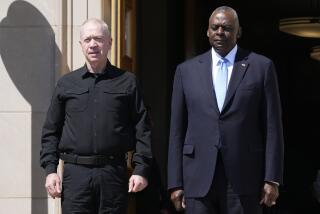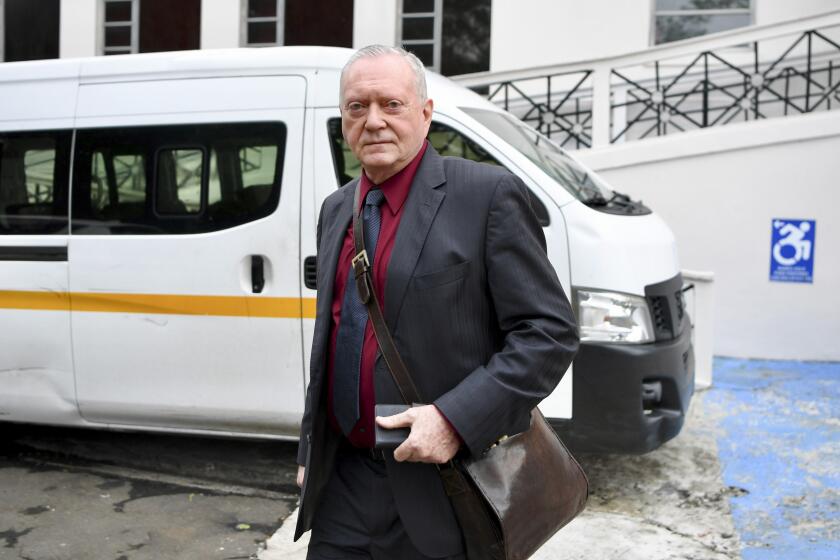Return to Repression in Russia?
It was a predawn arrest typical of the old Soviet KGB. Angry banging at the door woke Capt. Alexander Nikitin and his family. Uniformed men stormed into the apartment, barring his wife from running out onto the landing for help. She tried to phone someone, but the line was cut off.
“Imagine how terrifying it was,” said Nikitin’s wife, Tatyana Y. Chernova, who, despite an air of determined calm, could not quite keep the tension out of her voice. “They wouldn’t show us their ID. But they said they were security police and were taking him for interrogation. And they said he’d be back soon.”
Nine months later, Nikitin has still not come home.
The former naval officer was arrested for contributing to a report by the Norwegian environmental group Bellona on how Russia’s Northern Fleet handles nuclear waste from its submarines. He is awaiting trial on a charge of treason by espionage.
Nikitin’s case has become the most internationally notorious of several court actions initiated over the last year, on weak charges, by a KGB successor, the Russian Federal Security Service, or FSB.
Human rights workers are the most outspoken of observers saying that they see a trend: The former KGB is out to grab back its Soviet-era powers over citizens’ deeds, words and thoughts as the democracy of the early 1990s seizes up.
“The Nikitin case is an attempt to get back part of their power. If he is found guilty, any person who works with foreign organizations will be under threat,” said Boris P. Pustyntsev, head of the St. Petersburg rights group Citizens’ Watch, which is monitoring the case.
To some observers, such statements smack of paranoia. Former dissidents’ long opposition to Soviet persecution left its mark--on the earnest whispers of their conversation, on their tiny offices crammed with long photocopied petitions and on their persistent suspicion that Big Brother is still watching them.
Most other Russians have come to feel free. Living in a bustling, advertisement-filled world, where Mercedeses, mobile phones and holidays abroad are discussed more than politics, ordinary people are no longer shy about roundly denouncing their leaders in colorful language.
But many Russians say that new freedom is gradually being eroded.
They say a confused new political system and a weak judiciary--institutions that were supposed to become strong enough to protect Russians against any revival of the old-style secret police--are in fact incapable of doing their job against a resurgent KGB.
These fears have been given new weight by this year’s cases.
In a burst of enthusiasm for democracy, the KGB’s functions were dispersed among several agencies when the Soviet Union collapsed in 1991. But, since 1993, President Boris N. Yeltsin’s initial reform agenda has been replaced by a tougher nationalism, and the KGB’s successor agencies gradually have been re-integrated and put under direct presidential control.
“A KGB skeleton is still intact and is essentially being reassembled,” wrote Michael J. Kozakavich, of Canada’s University of Calgary in Alberta, in the analytical journal Transition.
The FSB, created in April 1995, had won back control of all intelligence-gathering by the beginning of this year.
In July, Yeltsin listed its sweeping new priorities as combating terrorism and counterespionage within Russia, fighting corruption and ensuring economic security--tasks that portray a Russia under siege from within and without by unprincipled elements.
The West, which once watched Soviet Russia’s human rights abuses like a hawk and made each violation of the 1975 Helsinki human rights accords an international scandal, now meekly accepts its ally Moscow’s argument that human rights issues must be settled internally, British analyst John M. Morrison said.
“Of course, that’s a step backward,” said Morrison, author of a biography of Yeltsin.
“Today, as in Soviet times, the pressure of the international community remains the only realistic means of persuading the Russian government to resort to deeds, not words, and abide by principles that place priority on citizens’ rights, and to cease gross abuse of those rights,” Pustyntsev wrote in defense of the imprisoned Nikitin.
Secrets and Trials
Shaggy and pitiful, Nikitin makes occasional appearances at court hearings. Otherwise, he lives in an FSB prison, in a 6-square-yard cell that he shares with a prisoner who his wife suspects is a secret police informer.
He and Bellona say the charge that he gave away state secrets from his days in the Northern Fleet at Murmansk is nonsense: All the information on actions involving nuclear submarines, which he provided in a 10-page section of the Bellona report, has been published by Russia’s outspoken press.
The secret police, however, are not letting up.
In October, St. Petersburg officials seized 1,500 copies of the Bellona report--even as a European Union envoy visited to investigate Nikitin’s case.
The envoy, Elisabeth Schroetder of Germany, said Nikitin is innocent, the case is politically motivated and Russia risks expulsion from the Council of Europe, an international rights body, by holding him.
Investigators have told Nikitin’s lawyer, Yuri M. Schmidt, that the environmentalist will be tried not under normal Russian law but under secret Defense Ministry rules--so secret that Nikitin cannot be told what they are.
In retaliation, Nikitin has refused to read the investigators’ report and sign a protocol saying he has been provided with all the documents needed to prepare his defense--the last step before the case can go to court. For the moment, there is deadlock.
“When I visit him, and show the FSB minders the new laws, which give him rights he isn’t actually getting, they just laugh in my face. They say Russian Federation law doesn’t apply to them, and they have internal instructions which haven’t changed since Stalin’s day,” his wife said bitterly.
This is not the only reminder of the bad old days.
Moscow human rights worker Lev M. Timofeyev lists seven or eight lesser cases in the last year of writers called in for FSB questioning on the political content of their work. Timofeyev said the questions were a way for the FSB to “show its teeth.”
Another bizarre court case in Moscow features a veteran former dissident, writer Valeriya I. Novodvorskaya. She is accused by Gen. Anatoly V. Trofimov--now deputy head of the FSB, and the former KGB “Grand Inquisitor” of the notorious dissident trials of the 1970s--of inciting interracial hatred with racy articles critical of Russian emotional excess. She faces 18 months in jail.
Novodvorskaya--an appealing woman with a dramatic turn of phrase--calls Trofimov “a former persecutor of dissidents, the most terrifying figure . . . a powerful employee of the Ministry of Love.”
Like Nikitin, Novodvorskaya says the charges are nonsense.
The article of the penal code on interracial hatred is designed to protect ethnic minorities from prejudice, she said. It is “absurd” to invoke it to protect majority Russians from her abstract accusations that Russians have a “manic-depressive psychosis” and kowtow to strong authority but that they become “unbridled anarchists, robbers, thieves, rising up in permanent outsiders’ revolts” whenever strict control over them is relaxed.
The case recalls the institutional anti-Semitism of the Soviet era. Word got about after the case opened that Novodvorskaya was not an ethnic Russian but a Jew.
“They [the FSB] put it about that she was a ‘Person of Jewish Nationality’--an attempt to appeal to prejudice and xenophobia,” said Novodvorskaya’s lawyer, Genri M. Reznik.
In addition, her supporters say two of the FSB experts brought in to handle her case--Yuri Biryukov and Stanislav Roshchin--are veteran investigators from dictator Josef Stalin’s reign of terror and worked on a large-scale planned anti-Semitic purge that was interrupted only by Stalin’s death in 1953.
Conspiracy Theory
Lawyers, human rights workers and Russia’s ever-dwindling band of reform politicians all share a complex conspiracy theory.
They say the Nikitin and Novodvorskaya cases were begun on flimsy pretexts and that their real aim is political--an attempt to bring back to power Communists who would support the revival of the secret police.
The FSB in Moscow and the judge in the Novodvorskaya case have refused to comment.
“The forces who daydream about bringing back the persecution of people for anti-Soviet propaganda decided it was vital to create the image of an enemy of the people through a show trial,” Reznik said. “Who should it be? Obviously a democrat and intellectual, obviously a person of impure blood.”
Both cases were opened in February, shortly after the FSB won back control of intelligence monitoring and at the start of presidential election campaigning, when the incumbent Yeltsin scored 6% in popularity polls against a 20% showing by his Communist rival, Gennady A. Zyuganov.
Both cases were supposed to come to court just before the elections in June and July. The prosecutors’ idea, Reznik said, was to further alienate reform-minded voters already shocked by corruption under Yeltsin and by his pursuit of war against separatists in Chechnya, by making them believe that their president was holding “show trials” too.
“However much they dislike Yeltsin, most people agree that it’s good nowadays that no one interrogates you about your beliefs or puts you in prison for them. The idea was that now, just before the election, they would be confronted with a pure show trial--and not vote for Yeltsin,” Reznik said.
But, in both cases, canny defense tactics allowed delays until after Yeltsin won reelection, coming from behind with an unexpectedly strong campaign.
The mainstream press has accepted this conspiracy theory and reacted indignantly, denouncing what is widely seen as unjustified pursuit of innocents.
“We think [Novodvorskaya’s comments] are subjects for discussion, not a pretext for criminal prosecution,” complained the mass-market newspaper Moskovsky Komsomolets, whose breezy style makes it Russia’s most popular youth daily. “This is a glaring example of how the Communists would deal with the democrats if they were to get back into power. Novodvorskaya’s case is a trial balloon.”
Now the FSB is in an embarrassing position in both cases, lawyers say.
With Yeltsin back in power, it has nothing to gain from pursuing its actions. As of Jan. 1, a new criminal code will come into effect in Russia, with a moderate definition of espionage that should ensure Nikitin’s release, human rights monitor Pustyntsev said.
“The FSB doesn’t want to surrender, but in my opinion the case has already simply collapsed,” said Schmidt, Nikitin’s lawyer.
Novodvorskaya’s backers are also confident of victory--as long as Yeltsin, recovering from heart bypass surgery, stays in power.
“I think we have to look at the Novodvorskaya case as a provocation which didn’t work out,” said Konstantin N. Borovoi, a parliamentary deputy and Novodvorskaya’s ally. “All the press reacted the same way, calling it an outrage; they understood that letting these idiots condemn someone for a euphemism could be very bad for everyone.”
Novodvorskaya believes that her case dragged on after the election because uncertainty over Yeltsin’s illness has provoked what she calls a “latent, cold, civil war” between would-be successors--thus making frightened judges delay a final decision until they know who will be in charge.
At her trial in October, just weeks before Yeltsin’s operation, the nervous judge, Tatyana Gubanova, could not find enough evidence to render a guilty verdict. But instead of releasing Novodvorskaya, she sent the case back to the prosecutor’s office so additional evidence could be collected.
“I’m not saying Gubanova was called and told she had to produce a guilty verdict, but it’s clear the FSB created a climate of pressure,” Reznik said.
Judiciary Questions
Even if both cases do collapse amid easing political tension, their pursuit makes clear that Russia’s judiciary is still not an independent institution that can be relied on to be fair.
“We now have the institutions of democracy, but people don’t really understand them, and the institutions don’t work in a cultural vacuum,” Novodvorskaya said.
“It must be remembered that Russia has a long tradition of powerful secret police who maintain a political role and are responsible only to the highest political authority, if even that. There seems to be no question that this tendency still exists. The question is whether it can be prevented in the future,” said Kozakavich of the University of Calgary.
Some Russian lawyers are disappointed by the West’s hesitancy to condemn Russia’s official pursuit of both cases, just as it failed to condemn the Chechen war in 1994.
“We understood before that the Western approach to human rights was like the key opening up our closed society,” Schmidt said. “But today I think U.S. politicians are very shortsighted because, if they forget today about human rights, who will stop a complete dictator coming to power here tomorrow?”
* MYSTERIOUS GEMS
Russia settles lawsuit involving stolen diamonds. D1
* CAPITALIST MOVE
Russian stock begins trading on N.Y. Stock Exchange. D1
More to Read
Start your day right
Sign up for Essential California for news, features and recommendations from the L.A. Times and beyond in your inbox six days a week.
You may occasionally receive promotional content from the Los Angeles Times.






